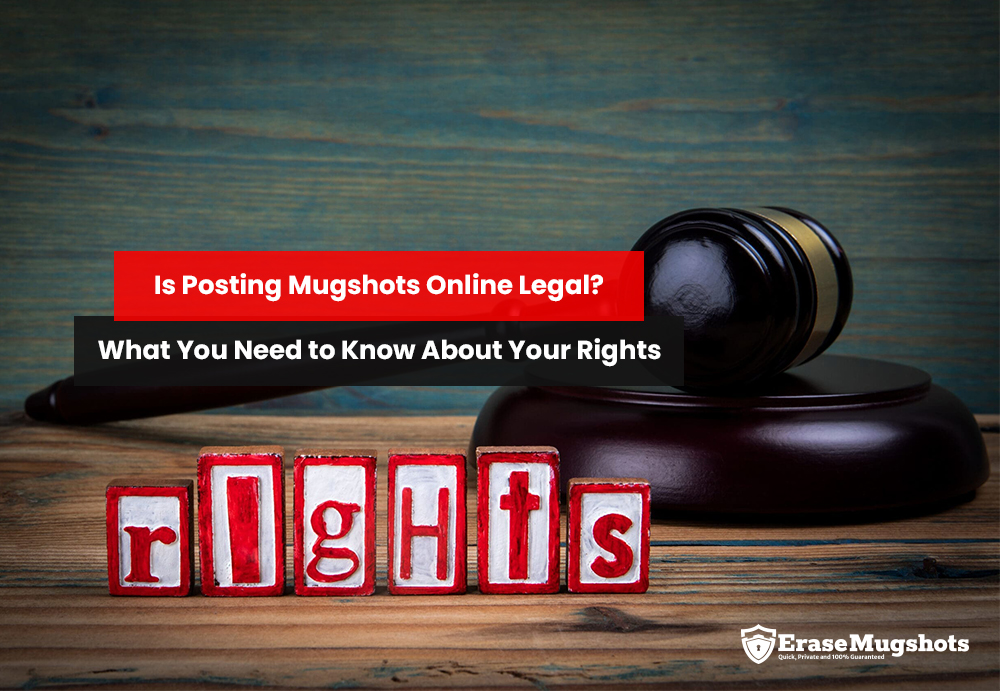100% Satisfaction Guaranteed
We offer a total mugshot removal solution to remove your mugshot and arrest details from the internet once and for all.

Table of Contents
Mugshots, taken at arrest, are now common online. What laws govern this? Are people protected from having their mugshot or their images shared without consent?
We examine the legality of posting mugshots online of criminal justice and the potential impacts on reputation and job opportunities.
We also discuss the rights of those whose mugshots booking photographs are posted and suggest alternatives for public information while protecting privacy.
Join us as we explore the complex world of mugshots and online posting.
Mugshots, or booking photos, are taken during an arrest and serve as visual records in law enforcement databases and public records.
These standardized images aid in identifying and tracking suspects. Due to the Freedom of Information Act, mugshots are often posted online to promote transparency, public safety, and legal system requirements.
These websites operate within public records laws, balancing accessibility with individual privacy rights.
The legality of posting mugshots online varies by state and federal laws, balancing public transparency and privacy rights.
State statutes often restrict fees for removing mugshots, while the federal Privacy Act of 1974 guides using personal information, including mugshots.
Agencies must notify individuals of their rights and offer ways to correct inaccuracies or request removal.
Understanding these legal frameworks is crucial for law enforcement and websites displaying arrest photos and mugshots.
Posting mugshots online can severely damage an individual’s online and professional reputation, leading to lost job opportunities and necessitating reputation management.
These images may influence potential employers conducting background checks, creating negative first impressions. Proactive reputation management is essential to restore one’s image and rebuild trust with employers.
Additionally, posting mugshots can lead to legal action, including defamation claims if accompanied by false statements and privacy violations if shared without consent.
Individuals may seek legal recourse and damages, with police departments and regulatory agencies playing a role in investigating complaints and enforcing laws.
Individuals posting online mugshots have specific privacy rights and legal options, including requesting removal from websites.
Individuals often need to submit a formal request to website administrators to request removal, who will verify their identity and assess their legal grounds.
Fees may apply for administrative costs. If posted without consent, individuals should contact the website directly for removal.
If cooperation is refused, legal recourse may involve filing complaints with relevant authorities or consulting an attorney specializing in internet privacy and defamation to explore further actions.
Documenting all correspondence is essential for potential legal proceedings.
There are several alternatives to posting mugshots online that balance public record transparency with privacy.
These methods keep the public and law enforcement agencies informed without compromising individual privacy.
Navigating the complex landscape of posting mugshots online requires understanding the intricate balance between legal transparency and individual privacy rights.
While mugshots are vital in law enforcement and public records, their online presence can severely impact personal and professional reputations.
Various laws and regulations, both state and federal, aim to govern this practice, providing individuals with rights and options for managing their online image.
Exploring alternatives to posting mugshots and adhering to privacy protections can help ensure that public information needs are met without compromising individual rights.
Individuals and law enforcement can navigate this challenging area more effectively by staying informed and proactive.
We offer a total mugshot removal solution to remove your mugshot and arrest details from the internet once and for all.